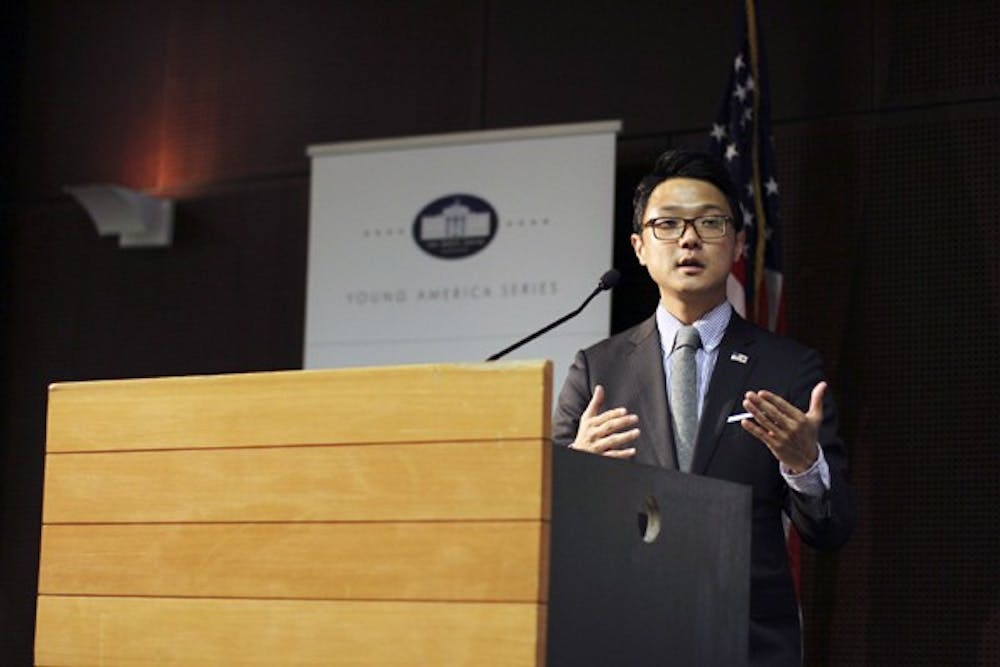Representatives from the White House Office of Public Engagement and the U.S. Department of Education hosted an open forum to discuss solutions for current and future American problems Monday afternoon.
The event, attended by about 75 students and community members, was held in the Memorial Union’s Ventana Ballroom and is the first in the White House Young Americaseries of meetings at 20 university campuses across the country.
Former ASU student Ronnie Cho, the White House Liaison to Young Americans, introduced the event, which was largely structured by its participants. He said it was important to remember that the event was not political.
“This is not about what happens to us in 2012,” Cho said. “This is about what’s going to happen in 2112.”
He said today’s students would determine solutions to challenges faced by Americans now and in the future, as well as what these challenges will be.
The participants then broke into groups to discuss the issues they felt were most important, including civic engagement, entrepreneurship, health care and education.
Electronics engineering technology junior Varun Thakkar came to the forum from the Polytechnic campus to discuss how to engage students in politics.
“We have the short end of the stick as far as making a difference because we’re poor college students,” Thakkar said.
The same principle, that money is needed to affect change, was also discussed in the group dedicated to entrepreneurship.
Entrepreneurship senior Zach Hamilton said the concept of entrepreneurship as it is preached at ASU is overrated.
“The word or the title of entrepreneur is dead,” Hamilton said. “We need to get away from the idea-sharing and go back to working.”
He said true entrepreneurship requires risk, where people invest everything in a new venture without a fallback plan.
“If your business isn’t a house of cards, you’re not putting enough into it,” Hamilton said.
In the education breakout group, students stressed the importance of developing skills in young people.
Several education students discussed how they would help as teachers.
Secondary education and physics senior Zachary Kovach said teachers are key to any solutions.
“If we’re going to be the changemakers, we need to start somewhere,” Kovach said, pointing to the easel and pad of paper he was brainstorming on with fellow education majors.
The effectiveness of standardized testing, affordability of education and proposed Arizona House Bill 2675, which would require students of Arizona’s public universities to pay $2,000 out of pocket toward their tuition, were prevalent topics in this group.
Elementary education freshman Maria Hernandez said making college accessible to everybody should be an important goal.
“Minorities want to go to college, but they often don’t know where to start,” Hernandez said.
She proposed a change to the loan process, so that the loan begins as a grant and only has to be paid back if students don’t fulfill certain requirements after graduation.
Participants shared their thoughts and solutions with the larger group after spending about an hour in the smaller discussion groups.
They then heard from Cho, representatives from the Department of Education, members of Undergraduate Student Government and University Senior Vice President for Educational Outreach and Student Services James Rund about ways to make these ideas a reality.
Interdisciplinary studies junior Keith Finkle, the president of the ASU Veterans Club, said social discussions are the first step to solving problems.
Finkle said he had seen a disconnect between veteran students and other students after he returned from two tours of duty in Iraq, but opportunities like this forum help to bridge the gap.
“We need to find a way for everyone to get involved at their own rate,” Finkle said. “If your goal is to be the next president, then there should be an easy path to that, but if your goal is to be educated and cast your own vote, there should be a path to that as well.”
Reach the reporter at julia.shumway@asu.edu or follow @JMShumway on Twitter.
Like The State Press on Facebook and follow @statepress on Twitter.




